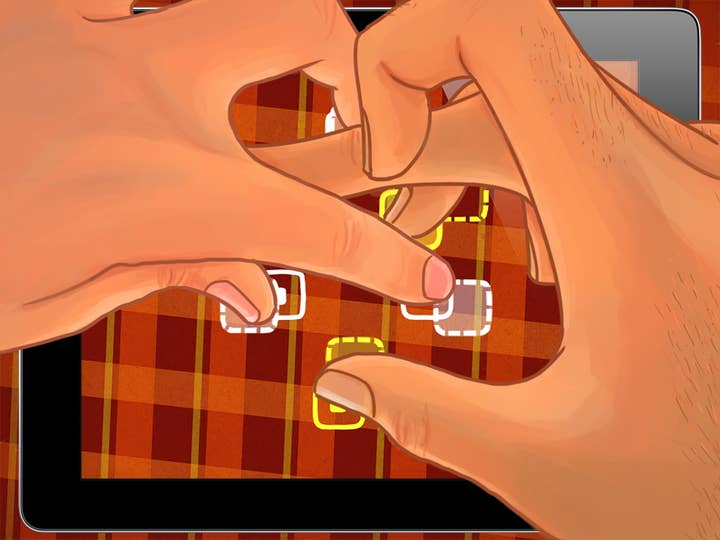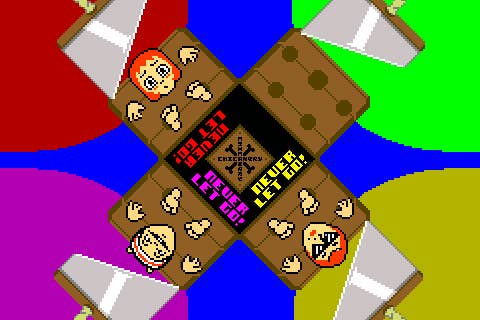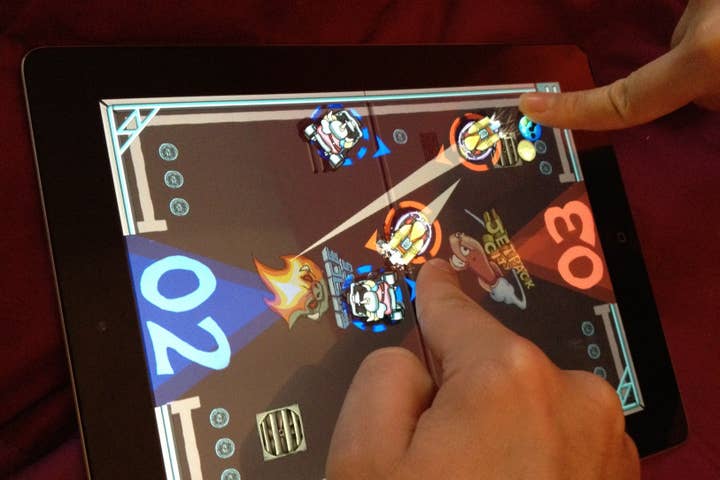Personal Space Invaders: Designing for Shared-Tablet Multiplayer
Creator of Slamjet Stadium Alistair Aitcheson details his design philosophy - embrace the fun and chaos of forced human interaction
There's nothing better than sharing gaming with friends. I grew up on a diet of 4-player Micro Machines and Goldeneye, crowding around the screen as a raucous group of shouting kids. Doubtless everyone has had similar experiences - in digital play or otherwise. Board games, parlour games, Wii games, and even drinking games have pushed the joy of shared play, and new technology is constantly offering exciting ways to play together.
"It's no longer just game-world enemies you need to deal with. Moving around each other is an interesting play challenge in itself"
For me, the most exciting new technology for group play is the one invading every living room, office, train and classroom today: the tablet. As a game designer I'm previously best known for indie iPad title Greedy Bankers vs The World - a colour-matching puzzle game where players can steal gems from each other by reaching over the screen.
Recently I released Slamjet Stadium for iPad, to critical acclaim. It's a physics-based football game played on hoverbikes, where players fling characters around the screen to score goals. There's nothing to stop you stealing each other's characters for your own, and traps and power-ups offer ample encouragement to mess each other up and grab each other's arms.
The tablet is a big canvas for simple tactile interactions. That means it's excellent for sharing between friends - there's plenty of room for everyone, and no longer are players separated by controller wires. Of course, when two players share a tablet they'll inevitably get in each other's way. My response is to embrace that - of course they'll get in each other's way, so make that part of the fun.
Getting Together
When players get in each other's way on a tablet, they are breaking down physical barriers, moving into each other's personal space. It brings us closer to each other, whether comfortably or not, and encourages to bond as human beings.
A fantastic example of this is in Game Oven's Fingle. Fingle is a game where two players must manoeuvre squares into moving targets with their fingertips, and where the puzzles require two people to solve. As such, play involves much rubbing of fingers up against each other's, the game's 70s porno groove soundtrack building a seedy, sweaty mood. It creates an emotional experience you'll certainly never forget. Working through an uncomfortable social interaction to solve a puzzle encourages cooperation and helps players bond.

Players who've enjoyed a shared experience like this come away with stories to tell. When I exhibited Greedy Bankers vs The World at events all kinds of funny situations emerged from competitive-spirited players. That's what drove players to come back with new friends to challenge. Grappling for each other's gems by reaching over the screen, one pair found themselves grabbing at each other's arms to push each other out of the way. It got so competitive that they ended up wrestling on the floor over the game.
This is the kind of player-generated anecdote that only comes out of physical play. Real - often humorous - interactions with real, unpredictable, human beings.
Expanding Into the Real World
It's not just the emotional response that makes shared-tablet gaming so endearing. An opponent's arm, grabbing for a character on the Slamjet Stadium board, may block your path, and it's up to you to find a way around them in order to get to your own characters. It's no longer just game-world enemies you need to deal with. Moving around each other is an interesting play challenge in itself.
Involving the physical world in a digital game creates a wide range of play challenges and a vast possibility space for how to negotiate them.
Few games are as powerful a demonstrator of this as Chicanery - designed by Anna Anthropy and ported to iOS by Bennett Foddy. The rules of this game are simple. Each player holds their finger on a corner of the screen. Removing their finger causes their avatar to be beheaded, and the winner is the last player with their neck intact.
"Where online gaming provides excellent tests of skill and a vast array of opponents, local play gets us interacting as human beings"
Success comes from getting your opponent to remove their hand from the screen - be it by pushing them, grabbing their arms, tickling them, beating them with a cushion, verbal trickery or mindgames. The physical world offers an infinity of strategies, limited only by players' imagination. The device merely acts as a scorekeeper, and creativity is encouraged.
My personal design ethos is to put laughter at the centre of the experience. Where online gaming provides excellent tests of skill and a vast array of opponents, local play gets us interacting as human beings. In this case, it's more important that the experience is entertaining and memorable than it is "fair". There is no better signifier of shared joy than laughter.
Designing a Memorable Experience
So what gets shared-tablet players laughing and cheering? First off is surprise. I designed the power-ups in Slamjet Stadium primarily to add a sudden twist to play - something to think fast and react to. It was obvious in public playtests how much a sudden and radical twist to play boosted excitement. Impact was more important than strategic advantage, or even fairness.
But the one thing that Greedy Bankers players commented on more than anything was how much they loved stealing from each other. There's a sense of mischief in reaching onto your opponent's board and taking what's theirs. Players love to cheat.

We all love cheating the system, cheating the technology, and also cheating the social norms that discourage us from physical contact. There's a sense that you've outsmarted the game, as it can't tell whose hands are whose. In Slamjet Stadium, you can use your opponent's characters as well as your own... but only if they let you get away with it.
A game I particularly admire in this respect is George Buckenham's A Bastard, currently in-development for iPad, but with a superb keyboard-based version playable in a browser.
Two players move their tanks around the arena, with different buttons to move their tank forward, left and right. After a button is pressed, it moves and you need to find it again, and the aim is to line up and shoot your opponent's tank. Cheating is simple: as well as pressing your own buttons you can press your opponent's, lining their tank up with your shots.
"There's a sense of mischief in reaching onto your opponent's board and taking what's theirs. Players love to cheat"
Cheating creates a sense of schadenfreude for the winner, and an underdog mentality for the loser, who sees a need to prove themselves in the face of such trickery. We get emotional resonance, an encouragement to play harder, and some incredibly funny moments.
Splitting the tablet into "your side" and "my side" is a relic of a controller age. We can let the device simply facilitate play - for example, detecting when balls go in the red goal and when they go in the blue goal. Beyond that, it's up to players to decide how to interact with the board. Let them cheat as creatively as they can.
The Future of Shared-Tablet Play
Sharing a tablet may be an unusually low-tech approach to multiplayer - especially in contrast to high-tech MMO's and online play - but there's a hunger for these kinds of interpersonal experiences. Events like Wild Rumpus, Local Multiplayer Picnic and GameCity already provide social showcases for multiplayer games, often with a focus on the intersection of technology and the physical.
In fact, Apple's current Tabletop Gaming feature in the iPad App Store shows they're aware of this hunger within their audience. These are games that can be enjoyed in the living room with family, or on the train, in the pub, at a party... games which bring us all closer together as human beings.
Tablets give us a big space with room for multiple players to share. They expand the game world beyond the screen and into the physical space. They get us physically interacting at a human level. They create stories and give us opportunities to express ourselves through cheating and foul play.
As tablets get bigger and more commonplace there'll be more and more opportunities for us to play together on them. As a designer I couldn't be more excited.
Alistair Aitcheson is a one-man indie games developer, responsible for Greedy Bankers vs. the World and Slamjet Stadium. You can find out more about his work here and follow him on Twitter.
